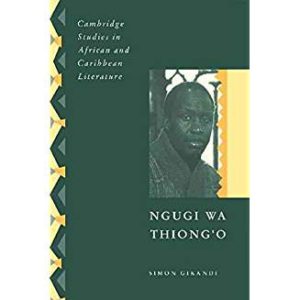Dreams in a Time of War
 A Childhood Memoir, by Ngugi wa Thiong’o. Pantheon 2010.
A Childhood Memoir, by Ngugi wa Thiong’o. Pantheon 2010.
Ngugi wa Thiong’o, one of Africa’s most prominent writers, was born in 1938 in Kenya, which was then a British-occupied country. He describes growing up in a village in the Kenyan Highland, and gives much evidence of the uprising of the Mau Mau people and their struggle against the British rule.
Ngugu wa Thiong’o’s father worked as a farmer and lived according to the rural traditions of the Gikuyu. He had four wives and 24 children. Ngugi recounts rural life on the farm, tells about the communal story-telling, the traditional rites like circumcision, and family customs within a polygamous family. During Ngugi’s youth, his father and mother became estranged, and she left the homestead to live with her father, taking Ngugi and a younger brother with her. His mother must have been a woman of considerable fortitude and character. She taught Ngugi the traditional knowledge and also enabled him to pursue a colonial education. Ngugi started school at the age of nine; he quickly exceled and began skipping grades. Already a lover of stories, his first primers in the Gikuyu language demonstrated to him that books have their own magic. “I realize that even written words can carry the music I loved in stories, particularly the choric melody.” He found a copy of the Old Testament and was enthralled by the stories of Cain and Abel, of David and King Saul, and of Daniel in the lion’s den. Through teachers and local storytellers he heard of such world figures as Winston Churchill, Jomo Kenyatta, and Jesse Owens. After World War II, the British tried to tighten the screws on the Kenyans in many ways. They took over control of African education by outlawing independent African-run schools and mandating a revisionist history curriculum.
“We learned that white people had discovered Mount Kenya and many of our lakes, including Lake Victoria. In the old school, Kenya was a black man’s country. In the new school, Kenya, like South Africa, was represented as having been sparsely populated before the whites arrived [which, of course, was false], and so whites occupied the uninhabited areas [also false].”
The hero in Ngugi’s childhood was his big brother Wallace, who was a Mau Mau guerrilla. While Ngugi was accepted into an elite high school in Kenya, and worried about where to get a pair of shoes, his brother was fighting against the white colonists in the mountains. It was his admiration for his brother and the struggle for independence that led to his sympathy for the oppressed. By the end of the story, the reader understands the love of language and performance that drove Ngugi to become a novelist and playwright. You see how he gained a deep understanding of rural life, political struggle, and the pains of modernization.
Novels and Autobiographies
African Traditional Life
Amkoullel, A Fula Child
Autobiographies
Aké. The Years of Childhood
Dreams in a Time of War
Facing the Lion: Growing Up Maasai on the African Savanna
Long Walk to Freedom
My Story
Unbowed: A Memoir
Coming of Age
Mandela’s Ego
Miriam's Song
Nervous Conditions
Purple Hibiscus
The Mending Season
Emigration
Lessons in Humanity
A Long Way Gone. Memoirs of a boy soldier
Child Soldier: Fighting for my life
I die, but my Memory lives on
Praise Song
Sozaboy
Stories about Friendship



